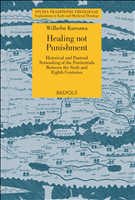- 丛书名 : Studia Traditionis Theologiae
- 中图分类号: B9
- 语种: ENG
- 出版信息: Brepols Publishers 2017 374页
- EISBN: 9782503575919
- PISBN-P: 9782503575896
- DOI:10.1484/M.STT-EB.5.113373
- 原文访问地址:
KG评星
知识图谱评星,是一种基于用户使用的评价体系,综合图书的评论数量、引文数量、Amazon评分以及图谱网络中节点的PageRank值(即考虑相邻节点数量和重要性)等多种因素计算而得出的评价数值。星级越高,推荐值越高。CAT核心级
核心学术资源(CAR)项目作为教图公司推出的一项知识型服务,旨在打造一套科学、有效的图书评价体系,并协助用户制定相应的馆藏建设方案。CAR项目调查和分析12所世界一流大学的藏书数据,以收藏学校的数量确定书目的核心级,核心级越高,代表书目的馆藏价值越高。选取核心级在三级以上,即三校以上共藏的图书作为核心书目(CAT)。The entire conception of repentance and penance in the Oriental Church in the first six centuries is a remedial one: sin represents an ailment of the soul. The confessor is called upon to meet the confessing person as a spiritual physician or soul-friend. Penance does not mean punishment, but healing like a salutary remedy. Nevertheless the lack of privacy led to the unwanted practice of postponing repentance and even baptism to the deathbed. An alternative procedure of repentance arose from the sixth century onwards in the Irish Church as well as in the Continental Church under the influence of Irish missionaries, and in the South-West-British and later the English Church (Insular Church). In treatises about repentance, called penitentials, ecclesiastical authorities of the sixth to the eight centuries wrote down regulations on how to deal with the different capital sins and minor trespasses committed by monks, clerics and laypeople. Church-representatives like Finnian, Columbanus, the anonymous author of the Ambrosianum, Cummean and Theodore developed a new conception of repentance that protected privacy and guaranteed a discrete, affordable as well as predictable penance, the paenitentia privata. They established an astonishing network in using their mutual interrelations. Here the earlier penitentials served as source for the later ones. But it is remarkable that the authors appeared as creative revisers, who took regard of the pastoral necessities of the entrusted flock. The aim of the authors was to enable the confessors to do the healing dialogue qualitatively in a high standard. The penitents should feel themselves healed, not punished.







 京公网安备 11010602104826号
京公网安备 11010602104826号
